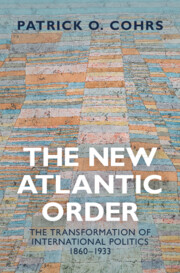Book contents
- The New Atlantic Order
- The New Atlantic Order
- Copyright page
- Dedication
- Contents
- Acknowledgements
- Abbreviations
- Maps
- Introduction
- Part I Inevitable Descent into the Abyss?
- Part II The Greatest War – and No Peace without Victory
- Part III Reorientations and Incipient Learning Processes
- Part IV No Pax Atlantica
- Epilogue The Political Consequences of the Peace
- 22 Peace Undermined
- 23 Towards a New Order
- 24 The Remarkable Consolidation of the Nascent Pax Atlantica of the 1920s
- Final Perspectives The Cadmeian Peace
- Bibliography
- Index
23 - Towards a New Order
Constructive Learning Processes and the Construction of an Atlantic Peace beyond Versailles
from Epilogue - The Political Consequences of the Peace
Published online by Cambridge University Press: 22 April 2022
- The New Atlantic Order
- The New Atlantic Order
- Copyright page
- Dedication
- Contents
- Acknowledgements
- Abbreviations
- Maps
- Introduction
- Part I Inevitable Descent into the Abyss?
- Part II The Greatest War – and No Peace without Victory
- Part III Reorientations and Incipient Learning Processes
- Part IV No Pax Atlantica
- Epilogue The Political Consequences of the Peace
- 22 Peace Undermined
- 23 Towards a New Order
- 24 The Remarkable Consolidation of the Nascent Pax Atlantica of the 1920s
- Final Perspectives The Cadmeian Peace
- Bibliography
- Index
Summary
Chapter 23 shows how in the wake of the Ruhr crisis a further transformation of European and transatlantic politics was initiated, which led to significant reforms of the Versailles system and the construction of a more sustainable Atlantic peace system in the mid-1920s. It brings out that this system came to be premised on the watershed settlements of the London reparations conference of 1924 and the Locarno security pact of 1925. And it argues that what made these advances possible were constructive learning processes both on the part of the victors and on the part of the vanquished of the Great War. It highlights that these processes gave rise to the formation of a novel European concert, which began to integrate Weimar Germany in a reconfigured Atlantic order, supported by an informal American hegemon, that began to stabilise not only western but also eastern Europe.
Keywords
- Type
- Chapter
- Information
- The New Atlantic OrderThe Transformation of International Politics, 1860–1933, pp. 933 - 960Publisher: Cambridge University PressPrint publication year: 2022

